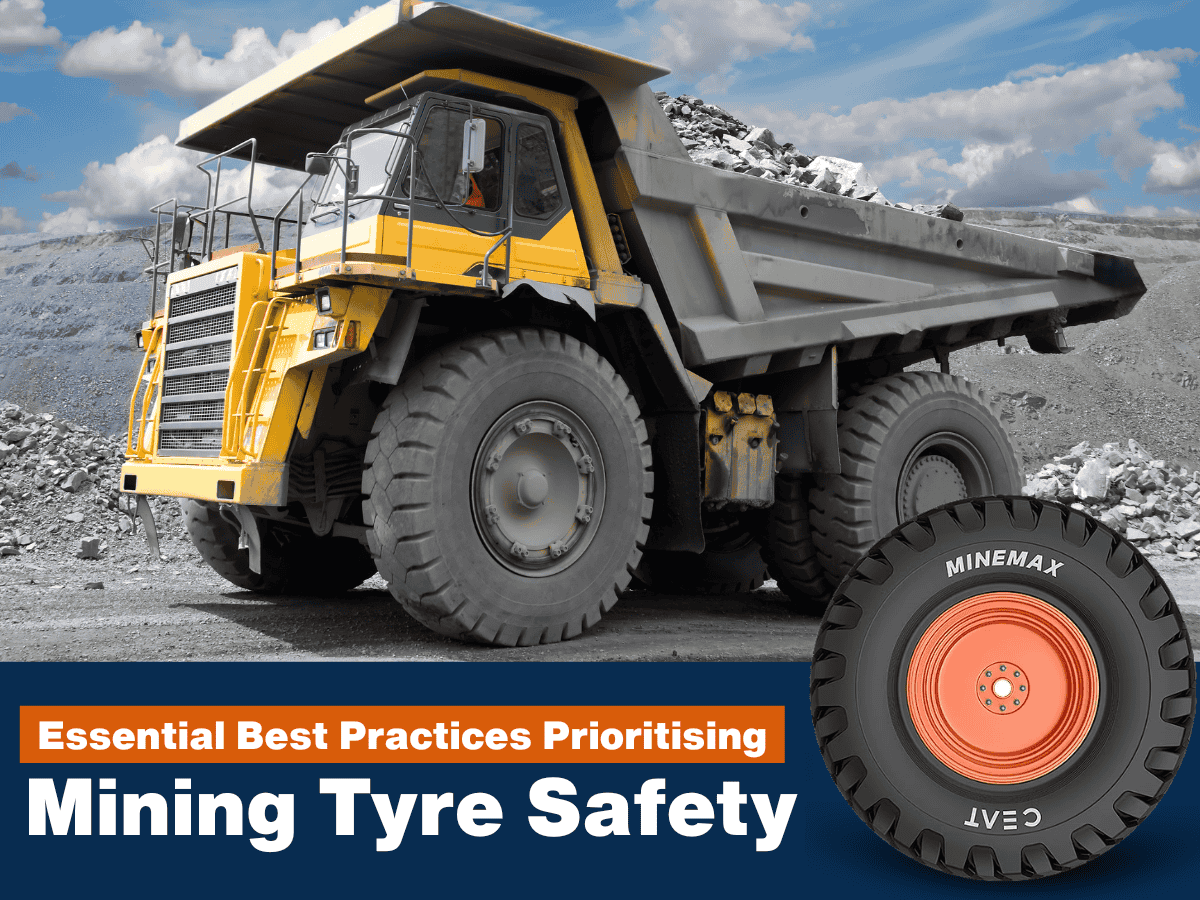ceat-speciality:blogs-tags/all,ceat-speciality:blogs-tags/tyre-care
Prioritising Mining Tyre Safety: Essential Best Practices for a Secure Environment
Sat, 7 Jun 2025 | PRODUCTS
Mining operations rely heavily on specialised tyres designed to withstand extreme conditions, including rocky terrains, high loads, and harsh weather. However, tyre failures can pose serious risks, from equipment downtime to life-threatening accidents.
At CEAT Specialty, we recognise that prioritising mining tyre safety is not just about enhancing performance—it’s about ensuring a secure work environment for operators and crew members. This guide explores best practices for maintaining mining tyres, reducing risks, and improving operational efficiency.
Understanding the Importance of Mining Tyre Safety
Mining tyres operate under extreme stress, making them vulnerable to heat build-up, punctures, and structural failures. Ignoring tyre safety can result in:
🚧 Costly equipment damage due to blowouts.
🔧 Operational delays caused by unexpected repairs.
🦺 Worker injuries from tyre-related incidents.
💰 Increased maintenance expenses due to premature wear.
To prevent these hazards, proactive tyre management strategies must be implemented across mining sites.
Best Practices for Mining Tyre Safety
1. Conduct Regular Tyre Inspections
Routine inspections help detect wear, cracks, bulges, and pressure inconsistencies before they escalate. Essential checks include:
✔ Tread depth measurement to assess traction and grip levels.
✔ Pressure monitoring to ensure tyres meet recommended inflation levels.
✔ Sidewall condition checks to identify cuts or impact damage.
Using advanced tyre monitoring systems can provide real-time data, allowing operators to act swiftly when irregularities appear.
2. Optimise Tyre Inflation for Performance & Safety
Correct tyre inflation is crucial for load distribution and stability. Under-inflation can lead to heat buildup and premature wear, while over-inflation increases blowout risks.
🔹 Use digital tyre pressure monitoring systems (TPMS) to track inflation levels accurately.
🔹 Adjust tyre pressure based on terrain and load to reduce structural strain.
🔹 Perform routine checks before and after each shift to prevent gradual air loss.
Maintaining optimal pressure improves traction, extends tyre life, and enhances overall safety.
3. Choose High-Quality Tyres for Extreme Conditions
Selecting durable and reinforced mining tyres can significantly lower failure risks and replacement frequency. Look for tyres with:
✅ Heat-resistant compounds to prevent overheating under intense workload.
✅ Deep treads & reinforced sidewalls for better impact absorption.
✅ Self-cleaning features to minimise debris accumulation.
Investing in premium mining tyres leads to lower replacement costs and greater safety assurances.
4. Implement a Comprehensive Tyre Maintenance Schedule
A structured tyre care routine ensures longevity and reliability. Key maintenance steps include:
🔧 Rotating tyres periodically to distribute wear evenly.
🔧 Cleaning tyre surfaces to remove debris that could cause punctures.
🔧 Aligning wheels properly to prevent uneven pressure distribution.
🔧 Monitoring heat levels to detect early signs of overheating.
Operators should be trained on tyre maintenance protocols, ensuring they handle routine inspections with precision and consistency.
5. Train Operators on Tyre Handling & Emergency Procedures
Proper tyre handling minimises risks during mining operations. Training programmes should cover:
🛠 Safe mounting and demounting techniques to prevent structural damage.
🚨 Emergency response plans for handling blowouts or tyre failures.
📖 Guidelines on tyre usage based on equipment specifications.
Educating workers ensures better decision-making in critical situations and strengthens on-site safety protocols.
Future Innovations in Mining Tyre Safety
The mining industry is constantly advancing, and new technologies are improving tyre durability and safety standards. Emerging developments include:
✔ Smart tyres with AI-powered sensors that provide real-time pressure & heat insights.
✔ Eco-friendly tyre materials that enhance sustainability without compromising strength.
Integrating these innovations into mining operations will further enhance efficiency and safety standards.
Final Thoughts: Strengthening Mining Tyre Safety for a Secure Work Environment
Prioritising mining tyre safety is essential for worker protection, operational efficiency, and long-term cost savings. Implementing best practices—from routine inspections to selecting premium tyres—reduces accident risks while extending tyre lifespan.
At CEAT Specialty, we advocate for responsible mining operations by promoting high-quality tyre solutions designed for extreme conditions. By following structured maintenance routines, optimising inflation, and leveraging smart technologies, mining sites can achieve maximum safety and efficiency.
💡 Ready to elevate mining tyre safety? Ensure best practices and secure your operations today! 🚜🦺








































































































































